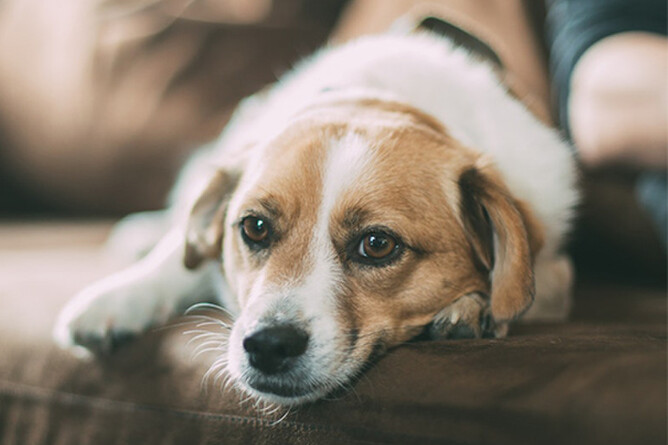First things first - what does an annoyed dog look like?
Though all pooches are different, most dogs tend to display the same signals when they’re annoyed. These are called appeasement gestures, which your dog will display when they’re feeling uncomfortable, stressed or fearful.
They may:
- lick their lips
- avert their eyes
- yawn
- sniff the ground
- tense up or pull away
You may recognise these from when your pooch is interacting with other dogs; they are simply her way of showing that she means no harm and doesn’t want to fight.
When you’re training or lightly telling off your pooch, it’s pretty normal for them to display one or two appeasement gestures, but the key is to recognise when you’re actually causing a high level of stress.
It’s not just rigorous training or a telling off that can annoy dogs – some of your daily human habits could be driving your pooch round the bend, even if they’re done with love.
Now that you know what to look for, let’s explore some of these doggie dislikes.
Hugging them
The ultimate display of human affection, a hug is actually not a dog’s natural way of showing love.
Though some pups do love a cuddle, many simply tolerate them, and some may even see them as a threat. This also obviously depends on the hug-giver – a hug from a stranger is very different to a trusted owner.
Watch their body language carefully to see whether they’re really loving the embrace as much as you are! Respect your pooch’s boundaries by asking strangers or visitors not to hug them, and rather direct your affection into stroking along their back and chest.
Rushing them through walks
Now this may seem like a no-brainer, but it really grinds your dog’s gears. Walks are a chance for your pooch to explore the world beyond the house, discovering what (and who) their neighbourhood is made up of.
They do this using primarily their nose, so give your pooch the chance to do what they do best: sniff! If possible, take them somewhere that you can let them off the lead and roam free.
Of course, this works best when you’re using consistent obedience training with your pup, so the exploring sessions can be neatly rounded up when the time comes.
Breaking routine
Aside from the odd surprise trip to the beach, unexpected changes are actually something your dog dislikes. Your pooch is likely to be a creature of habit, and deviating from routine may cause them a fair amount of stress.
A regular routine will actually boost your dog’s confidence, as she knows what to expect from life each day.
Even if you like a bit of variety in your life, try and keep things consistent for your pup – mealtimes, exercise and sleeping habits in particular. Try not to sleep in too long on your day off, stay out too late at night or go away for days at a time.
Teasing
While it might seem funny for you to wind up your pooch by hiding their ball or waving food in their face, remember they’re not in on the joke. Or, if you’re horrified at the thought of these ‘games’, make sure the kids and strangers your pooch comes in contact with know the deal.
As we mentioned earlier, dogs are creatures of habit, and being inconsistent with the messages you give can lead to one confused pup. This confusion can quickly lead to stress, insecurity and aggression.
So lay off the teasing and always reward your pup when they perform a behaviour correctly.
Being dressed up
Despite how obvious this one may seem, many poor pups are getting squeezed into fairy outfits without being consulted first.
Not surprisingly, dogs aren’t used to wearing clothes and it can really distress them. Imagine if someone squeezed you into a mascot suit every time you left the house!
Think about whether you really need to dress your pooch up or if it’s something your dog dislikes – unless they are really cold and need something to keep them warm, it’s probably not essential.
In the case of warmth, start with lighter pieces of clothing and slowly build up to jumpers or jackets, rewarding your dog as you go.
Dogs are sources of such joy in their owners’ lives, and seem to have an unlimited reservoir of unconditional love.
By becoming more tuned in to our pooches’ body language, we can start to repay this favour. Every dog is different, so try to get to know your dog’s likes and dislikes, and start to make their life a little easier.
Do you have any other questions about how you may be unwittingly pushing your dog’s buttons? Feel free to call us on: 09 448 2227.

